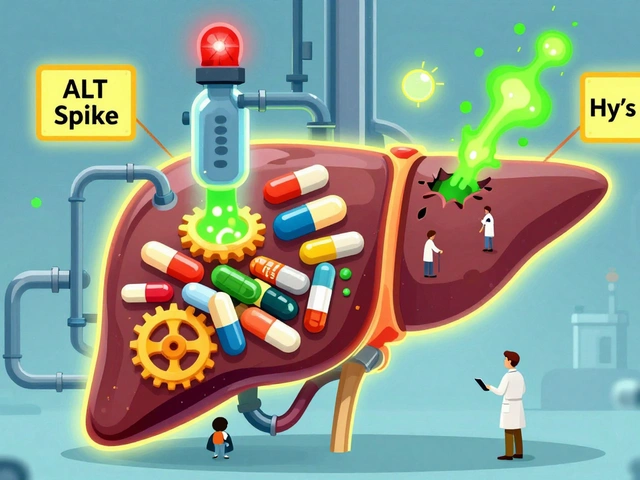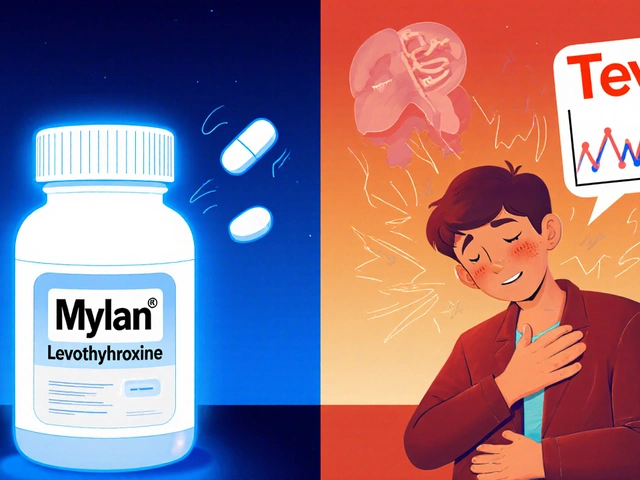
Brain-Healthy Diet Adherence Calculator
Rate how closely you follow brain-protective eating patterns and see your potential risk reduction.
Quick Takeaways
- Eating a Mediterranean‑style diet lowers the risk of Alzheimer‑type dementia by up to 30% in older adults.
- Omega‑3 fatty acids, antioxidants, and B‑vitamins are the most studied brain‑protective nutrients.
- Managing insulin resistance through diet is as important as physical exercise for cognitive health.
- Gut‑microbiome diversity supports the brain‑gut axis and may slow memory decline.
- Practical tips include weekly meal‑prep, choosing colorful produce, and limiting refined sugars.
Understanding Alzheimer‑type Dementia
When it comes to brain health, Alzheimer‑type dementia is a progressive neurodegenerative condition characterized by memory loss, cognitive decline, and behavioral changes caused by the buildup of amyloid plaques and tau tangles in the brain. The disease typically manifests after age 65, but the pathologic process may begin decades earlier.
Key risk factors include genetics (e.g., APOE‑ε4 allele), age, cardiovascular disease, and lifestyle choices. While we can’t change our DNA or the clock, nutrition offers a modifiable lever that can influence several of these pathways.
How Diet Impacts Brain Aging
Researchers have identified four main mechanisms through which food affects the brain:
- Chronic inflammation: Diets high in saturated fat and refined carbs trigger systemic inflammation, which crosses the blood‑brain barrier and accelerates plaque formation.
- Oxidative stress: Reactive oxygen species damage neurons; antioxidants neutralize them.
- Insulin resistance: When brain cells become less responsive to insulin, they lose the ability to use glucose efficiently, leading to energy deficits.
- Gut‑brain axis: A diverse gut microbiome produces short‑chain fatty acids that support neurogenesis and reduce neuroinflammation.
Targeted nutrition can tackle each of these mechanisms simultaneously, offering a multi‑layered defense against cognitive decline.

Evidence‑Based Diet Patterns
Three eating patterns consistently show protective effects in large cohort studies and randomized trials.
Mediterranean diet emphasizes olive oil, nuts, fish, whole grains, and abundant fruits and vegetables. A 2023 meta‑analysis of 15 prospective studies found a 28% risk reduction for Alzheimer‑type dementia among adherents.
MIND diet merges Mediterranean principles with specific brain‑healthy foods like blueberries and leafy greens. In the famed Chicago Health and Aging Project, participants with the highest MIND adherence had a 53% lower risk of dementia.
DASH diet (Dietary Approaches to Stop Hypertension) limits sodium and emphasizes potassium‑rich produce. Though originally designed for blood pressure, its emphasis on whole foods also correlates with slower cognitive decline.
| Diet | Core Foods | Primary Brain Benefits | Typical Reduction in Dementia Risk |
|---|---|---|---|
| Mediterranean | Olive oil, fatty fish, nuts, legumes, fruits, vegetables | Anti‑inflammatory, high omega‑3, antioxidant‑rich | ~28% |
| MIND | Blueberries, leafy greens, whole grains, fish, poultry | Boosts neuroplasticity, reduces oxidative stress | ~53% |
| DASH | Low‑fat dairy, nuts, fruits, vegetables, limited red meat | Improves vascular health, lowers blood pressure | ~20% |
Key Nutrients to Focus On
While whole‑food patterns matter most, several individual nutrients have strong evidence for brain protection.
- Omega‑3 fatty acids (EPA & DHA) - found in salmon, mackerel, and algae; support synaptic fluidity and reduce inflammation. Studies show a 15% slower rate of hippocampal atrophy with regular intake.
- Antioxidants - vitamin C, vitamin E, polyphenols (e.g., resveratrol, flavonoids). A 2022 trial reported that participants consuming ≥5 servings of berries weekly had better episodic memory scores.
- B‑vitamins (B6, B12, folate) - crucial for homocysteine metabolism; high homocysteine is linked to vascular damage in the brain. Fortified cereals and leafy greens keep levels in check.
- Vitamin D - modulates neuroimmune responses. Adequate serum levels (>30ng/mL) are associated with reduced risk of cognitive impairment.
- Polyphenol‑rich foods (green tea, dark chocolate) - promote neurogenesis via the brain‑derived neurotrophic factor (BDNF) pathway.
Instead of chasing supplements, aim to obtain these nutrients from diverse, colorful meals. Whole foods provide synergistic compounds that isolated pills often miss.
Practical Meal‑Planning Tips
- Plan a "brain‑boost" grocery list. Include salmon, sardines, extra‑virgin olive oil, walnuts, berries, spinach, broccoli, and fortified whole‑grain bread.
- Batch‑cook Mediterranean staples. Cook a large pot of lentil soup with turmeric and garlic on Sunday; portion it for lunches throughout the week.
- Swap refined carbs for low‑glycemic alternatives. Replace white rice with quinoa or barley to keep blood sugar stable.
- Include a “colorful plate” at every meal. Aim for at least three different colors-red tomatoes, orange carrots, green kale-to guarantee a mix of antioxidants.
- Mindful snacking. Choose a handful of mixed nuts or a piece of fruit instead of processed snacks that spike insulin.
- Hydrate wisely. Green tea or herbal infusions provide polyphenols; limit sugary drinks.
These habits fit easily into a busy Bristol lifestyle-think of a Sunday market stroll for fresh produce, then a quick 20‑minute stir‑fry for dinner.
Common Pitfalls & Myths
Even well‑meaning readers can stumble into misinformation.
- Myth: Low‑fat automatically means brain‑healthy. Some low‑fat processed foods replace fats with sugars, worsening insulin resistance.
- Myth: One super‑supplement will protect the brain. Randomized trials on high‑dose vitamin E showed no cognitive benefit and possible increased mortality.
- Pitfall: Ignoring portion sizes. Even healthy foods can contribute excess calories, leading to obesity-a major dementia risk factor.
- Pitfall: Forgetting the gut. Antibiotic overuse can disrupt the microbiome; probiotic‑rich foods like yogurt help restore balance.
Adopting a balanced diet while staying active, socially engaged, and mentally stimulated offers the best chance to prevent Alzheimer symptoms before they start.

Frequently Asked Questions
Can I reverse early memory loss with diet alone?
Diet can improve brain metabolism and reduce inflammation, which may stabilize or modestly improve early symptoms, but it’s rarely a stand‑alone cure. Combining dietary changes with exercise, cognitive training, and medical management yields the strongest results.
How much fish should I eat each week for optimal brain health?
Research points to two 3‑ounce servings of fatty fish (like salmon or sardines) per week. This provides roughly 500mg of EPA/DHA, enough to support synaptic function.
Are there specific foods that should be avoided completely?
Limit processed meats, sugary beverages, and refined pastries. These foods spike blood glucose and promote inflammation, both linked to higher dementia risk.
Do I need to take a supplement if I follow a Mediterranean diet?
Most nutrients are obtainable from food, but vitamin D and B12 can be low in plant‑focused meals, especially in winter months in the UK. A modest supplement after testing blood levels is often prudent.
How long does it take to see cognitive benefits after changing my diet?
Improvements in mood and attention can appear within weeks, while measurable changes in brain volume or memory performance typically emerge after 6‑12 months of consistent adherence.
18 Comments
Chelsea Wilmer
October 5 2025
One could argue that the very act of choosing what to eat is a microcosm of the existential quest for meaning, a Sartrean drama played out on a plate.
When the mind ponders the labyrinthine pathways of amyloid and tau, it is tempting to reduce the narrative to mere biochemistry, yet the soul of the matter lies in the stories we tell ourselves while sipping tea with a splash of lemon.
The MIND diet, in this philosophical framing, becomes a ritualistic rite, a symbolic gesture toward order amidst the chaotic entropy of aging.
Consider the omega‑3s as ambivalent poets, weaving verses of anti‑inflammation that soothe the brain's fragile synapses.
Similarly, the kaleidoscopic antioxidants are like ancient alchemists transmuting oxidative gloom into cellular vitality.
Yet, the paradox persists: while we bathe our neurons in these verdant elixirs, the universe remains indifferent, and the river of time flows unimpeded.
Thus, the dietary discipline is both a rebellion against fatalism and an acceptance of our mortal constraints.
In this dance, one must balance the stoic rigor of nutritional science with the playful curiosity of a child exploring a garden.
Only then can we hope to tilt the odds, not to conquer dementia, but to grant our memories a graceful waltz through the twilight years.
In the final reckoning, perhaps the most profound wisdom is to savor each bite as if it were a stanza in the epic poem of our lives.
lindsey tran
October 11 2025
Yo, this article is lit! I love how it breaks down the diets into simple steps; makes it real easy to follow.
Honestly, I’ve already started swapping my snack chips for a handful of walnuts-feels good.
Don’t forget to add some blueberries to your morning oats, they’re like brain‑boosting fireworks.
Let’s keep each other motivated, we got this!
Krishna Sirdar
October 16 2025
The key point is that consistency matters more than occasional super‑foods.
Try planning your meals weekly so you don’t fall back on processed snacks.
Include fish, nuts, and colorful veggies in most dishes.
Small changes add up to big brain benefits over time.
becca skyy
October 22 2025
Great rundown! I especially appreciate the practical tips for busy people.
Buying fresh produce at the local market makes a huge difference.
Keep sharing these gems!
Kiersten Denton
October 28 2025
Interesting read, I might try adding more leafy greens.
Will see how it goes.
Karl Norton
November 3 2025
Seems like just another fad diet with hype, not real science.
Ashley Leonard
November 9 2025
Krishna makes a solid point about meal planning.
Having a grocery list focused on salmon, nuts, and berries reduces decision fatigue.
Also, rotating whole grains keeps the diet interesting and nutrient‑dense.
Ramanathan Valliyappa
November 14 2025
Too much jargon, the average person will skip this.
Keep it simple.
Nymia Jones
November 20 2025
One cannot ignore the hidden agendas behind mainstream nutritional advice, especially when large corporations stand to profit from our health anxieties.
The promotion of certain diets often coincides with market pushes for expensive supplements and specialty foods.
Moreover, the research funding sources are frequently tied to the very industries they assess, compromising objectivity.
It is prudent to approach such recommendations with a critical eye and demand transparency.
Courage Nguluvhe
November 26 2025
From a systems‑biology standpoint, integrating macro‑nutrient ratios with microbiome modulation yields a synergistic effect on neurogenesis.
Leveraging bio‑informatics to track biomarker shifts can personalize dietary interventions.
Such precision nutrition transcends generic guidelines and aligns with emerging neuro‑metabolic paradigms.
Adopting data‑driven protocols may accelerate cognitive resilience.
dee gillette
December 2 2025
While the evidence appears promising, one must consider the potential for confirmation bias in observational studies.
Randomized controlled trials often yield more modest effect sizes.
Thus, a balanced skepticism is warranted.
Jasin P.
December 8 2025
Sure, because what the government wants us to eat is always perfect.
Reality check: not everyone can afford salmon every week.
Lily Đàn bà
December 13 2025
Our great nation deserves the best brain food, not the cheap junk imported from abroad.
Support local producers who grow real, wholesome produce.
Only then will we keep our citizens sharp and proud.
Joseph O'Sullivan
December 19 2025
Totally agree, local farms give you fresher veggies and stronger brains.
Give it a try and let us know how it works.
Conor McCandless
December 25 2025
Ah, the drama of diet! One minute you’re dazzled by a glossy brochure promising miracle memory enhancement, the next you’re staring into an empty fridge wondering where the motivation vanished.
But behold, the truth lies not in fleeting headlines but in the quiet, repetitive rituals of kitchen alchemy.
When you sift quinoa, you are, in essence, performing a slow‑burn symphony for your neurons.
The humble act of chopping kale becomes a meditation, a deliberate defiance against the chaotic tide of modern life.
Each serving of oily fish is a pact with the sea, borrowing its ancient wisdom to lubricate synaptic highways.
And those berries, speckled like stars, are tiny galactic furnaces fusing antioxidant fire into your cerebral cortex.
Remember, the body is a vessel; the mind is its compass, and nourishment is the wind that guides it forward.
So, let the plates be your canvas, your choices the brushstrokes upon which longevity is painted.
kat gee
December 31 2025
Sure thing, the diet works.
Iain Clarke
January 5 2026
Excellent summary of the practical steps-meal prep and colorful plates are key.
Remember to stay hydrated with green tea for extra polyphenols.
Consistency will pay off in the long run.






Ian Howard
September 29 2025
The brain is a delicate organ that thrives on a symphony of nutrients, not just isolated supplements.
Think of the Mediterranean pattern as a vibrant tapestry woven from olive oil, oily fish, nuts, and a kaleidoscope of fruits and vegetables.
Each bite supplies omega‑3 fatty acids that lubricate neuronal membranes and keep synapses humming.
Antioxidants like resveratrol and flavonoids act as vigilant guardians, neutralizing rogue free radicals before they can scar the hippocampus.
B‑vitamins, especially B12 and folate, are the unsung chemists that keep homocysteine levels in check, preventing vascular sabotage of the brain.
Vitamin D, often overlooked, helps modulate neuroinflammation and has been linked to slower cognitive decline.
The gut microbiome, nourished by fiber‑rich legumes and whole grains, produces short‑chain fatty acids that whisper growth signals to newborn neurons.
When you pair these foods with a modest reduction in refined sugars, insulin signaling improves, granting the brain a steady supply of glucose.
The MIND diet cherry‑picks the best of Mediterranean wisdom while adding blueberries and leafy greens as star performers.
Studies repeatedly show that high adherence can shave off up to half of the risk for Alzheimer's‑type dementia.
Even a moderate adherence, hovering around sixty percent, confers a respectable twenty‑plus percent risk reduction.
The beauty of this approach lies in its accessibility – a weekly salmon fillet, a handful of walnuts, and a splash of olive oil are all you need to start.
Meal‑prepping a lentil stew on Sunday can anchor your weekdays with protein, fiber, and polyphenols.
Remember, consistency beats occasional extravagance; the brain rewards sustained dietary patterns more than sporadic super‑foods.
So, as you recalibrate your plate, imagine each colorful morsel as a tiny shield fortifying your memories for the decades ahead.